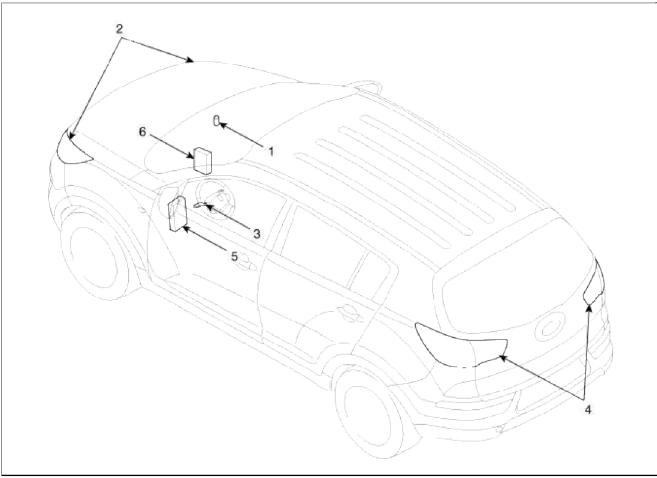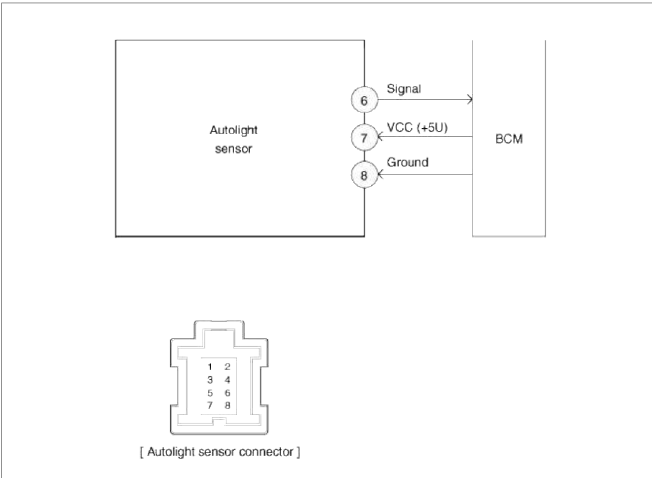Kia Sportage: Specifications, Components and Components Location, Description and Operation | Auto Light Sensor
Specifications
Specifications

Components and Components Location
Component Location

- Auto light sensor
- Head lamps
- Lighting switch (Auto)
- Tail lamps
- SJB (Smart Junction Box)
- BCM (Body Control Module)
Schematic Diagrams
Circuit Diagram

-
Photo signal (+)
-
-
Photo signal, RH (-)
-
-
Photo signal, LH (-)
-
Signal
-
VCC (+5V)
-
Ground
Description and Operation
Description
This function describes the following features
- Input detection by Auto Light Sensor.
- Generate Auto Light Out Status data.
- Send Auto Light Out Status.
- Tail Lamp Control by Auto light Mode.
- Head Lamp Low Control by Auto light Mode.
- AV Tail Control by Auto Light sensor level.
- Auto Light Mode State Diagram is based on Auto Light Sensor's level.
- Power condition of Auto Light Action
- When ACC, IGN, START terminal states, Auto Light Sensor operates.
Auto Light Sensor
Repair procedures
Inspection
In the state of IGN1 ON, when multi function switch module detects auto light switch on, tail lamp relay output and head lamp low relay output are controlled according to auto light sensor's input.
The auto light control doesn't work if the pin sunlight supply (5V regulated power from Ignition 1 power to sunlight sensor) is in short circuit with the ground.
If IGN1 ON, The IPM monitors the range of this supply and raises up a failure as soon as the supply's voltage is out of range. Then this failure occurs and as long as this is present, the head lamp must be turned on without taking care about the sunlight level provided by the sensor.
This is designed to prevent any head lamp cut off when the failure occurs during the night.

Removal
1. Disconnect the negative (-) battery terminal.
2. Remove the photo & auto light sensor (A) from crash pad upper side by using a flat-up screwdriver.

3. Remove the auto light sensor connector.
Installation
1. Reconnect the auto light sensor connector.
2. Install the auto light sensor.
READ NEXT:
 Schematic Diagrams, Description and Operation
Schematic Diagrams, Description and Operation
Schematic Diagrams
Circuit Diagram
Description and Operation
Description
The immobilizer system will disable the vehicle unless the proper ignition
key is used, in addition to the
SEE MORE:
 How to deactivate the Smart Liftgate with Auto Open function using the smart key
How to deactivate the Smart Liftgate with Auto Open function using the smart key
Door lock
Door unlock
Liftgate open
Panic button
Remote start
If you press any button of the smart key
during the Detect and Alert stage, the
Smart Liftgate with Auto Open function
will be deactivated.
Make sure to be aware of how to deactivate
the Smart Liftgate with Auto Ope
 Alternator
Alternator
Components and Components Location
Components
Pulley
Front bracket
Front bearing
Rotor
Rear bearing
Rear bracket
Though bolt
Regulator
assembly
Regulator bolt
Rear cover
Repair procedures
Removal and Installation
1. Disconnect the battery negative terminal first
Content
- Home
- Kia Sportage - Fifth generation (NQ5) - (2022-2026) - Owner's Manual
- Kia Sportage - Second generation (JEKM) (2005-2015) - Body Workshop Manual
- Kia Sportage Third generation (SL) - (2011-2016) - Service and Repair Manual
- Sitemap
- Top articles